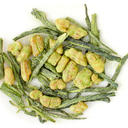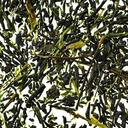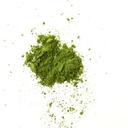Organic Ryokucha Green Tea - Organic
 |
|
Commercial Description
Genmaicha, Samovar-style. Japanese matcha powder blended with toasted brown rice and steamed green tea. A meal unto itself. Cereal-like and nutty, a touch of grassiness, and the ultimate for breakfast.
Brewing Instructions: (from Samovar Tea Lounge)
1-2 tablespoons / 16 oz. water. "Just below boiling" water, 30-45 sec. infusion. Followed by 1-3 minute infusions. Steep for 3-7 more infusions.
Ratings & Reviews
Page 1 of 1 page with 2 reviews
 80 Aroma: 8/10 Flavor: 5/5 Value: 2/5
80 Aroma: 8/10 Flavor: 5/5 Value: 2/5homais (21 reviews) on Mar. 13th, 2014
This tea really grew on me, and by the end I adored it. The sample I got - which was enough for one cup - suggested brewing it very quickly, just 30-45 seconds, with water just below the boiling point. In retrospect I think that following those instructions would have worked out well, but I'm paranoid about using water that hot with more delicate green teas, so I did two steepings at 175 degrees, first one minute, then two.
With the fist cup, I could get a little of the toasted rice smell - more like toasted bread than popcorn - and a strong whiff of matcha. The taste was, at first, almost too much for me. It was powerfully vegetal and seaweedy, rich and deep and umami, to the point that the toasted rice element was drowned out. Whatever the base tea is, it's a much higher grade than what's usually used in genmaicha, and it showed.
As I kept drinking the cup, however, I started to get that familiar roasty-toasty genmaicha taste as well, which continued buzzing on my tongue for a good ten minutes after I was done drinking. The result was this deliciously savory balance: rich, vegetal, a bit darkly fruity, and toasty. The toasty element was even stronger in the second infusion, and the tea remained very, very flavorful. I strongly suspect it would have been good for a third or even fourth steeping.
In short, this is a really flavorful, satisfying tea: the base tea and the matcha seem to be of high quality, and they play nicely with the toasted rice. As other reviewers note, it might not be worth the high price point, but it's delicious.
 73 Aroma: 8/10 Flavor: 4/5 Value: 2/5
73 Aroma: 8/10 Flavor: 4/5 Value: 2/5Alex Zorach (1453 reviews) on Sep. 26th, 2013
Dry leaf has a potent, cereal-like aroma.
First infusion brews a hazy, pale golden cup...it almost looks like there's a tiny bit of iridescent dust on top of the tea's surface.
Flavor is mild but delightful...sweet, crisp, and with a hint of a fruitiness that I can only describe as reminiscent of cola. It sort of suggested sweetness, but in a deeper, darker way, less transient than the fruitiness of many teas.
The name of this tea puzzles me...it seems like genmaicha+matcha...is ryokucha used as the base? This isn't clear from the company's description.
Very atypical for a genmaicha. I found that I was unable to get the brewed cup to smell as complex as the dry leaf, however. I got many infusions, and they were all mild and enjoyable. The brewing temperature did not seem to affect the outcome very much. Easy to brew, although hard to get as strong tasting...this seems pretty mellow even if I use longer steeping times and more leaf. Works better with many, shorter infusions.
This tea was very, very expensive...the price really surprises me. Why use such high-end tea for Genmaicha? It's pricier even than Octavia's genmaicha, which I think I liked better than this one...granted, that's a very different tea, less complex on the fruity end, and without matcha.
Was this better than, say, Wegmans genmaicha with matcha? Absolutely, as far as I'm concerned. I even thought it was better than Aiya's, which is in a similar price range. Was it worth the price though? Probably not, to me. If I'm going to spend this much on tea I want a pure tea...a pure green tea, or maybe an oolong or maybe even a very high grade of single-estate black tea.
Thank you to E. Alexander Gerster for this sample!
Page 1 of 1 page with 2 reviews
More Teas from Japan from Samovar Tea Lounge

Nishi Sencha 1st Flush Organic Green Tea
| Style: | Sencha |
| Region: | Kagoshima, Japan |
| Caffeine: | Caffeinated |
| Leaf: | Loose |




